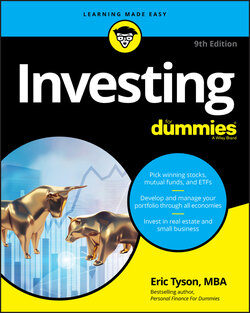Читать книгу Investing For Dummies - Eric Tyson - Страница 32
Pare down holdings in bloated markets
ОглавлениеPerhaps you’ve heard the expression “buy low, sell high.” Although I don’t believe that you can time the markets (that is, predict the most profitable time to buy and sell), spotting a greatly overpriced or underpriced market isn’t too difficult. For example, in the second edition of this book, published in 1999, I warned readers about the grossly inflated prices of many internet and technology stocks (see Chapter 5). Throughout this book, I explain some simple yet powerful methods you can use to measure whether a particular investment market is of fair value, of good value, or overpriced. You should avoid overpriced investments for two important reasons:
If and when these overpriced investments fall, they usually fall farther and faster than more fairly priced investments.
You should be able to find other investments that offer higher potential returns.
Ideally, you want to avoid having a lot of your money in markets that appear overpriced (see Chapter 5 for how to spot pricey markets). Practically speaking, avoiding overpriced markets doesn’t mean that you should try to sell all your holdings in such markets with the vain hope of buying them back at a much lower price. However, you may benefit from the following strategies:
Invest new money elsewhere. Focus your investment of new money somewhere other than the overpriced market; put it into investments that offer you better values. As a result, without selling any of your seemingly expensive investments, you make them a smaller portion of your total holdings. If you hold investments outside of tax-sheltered retirement accounts, focusing your money elsewhere also allows you to avoid incurring taxes from selling appreciated investments.
If you have to sell, sell the expensive stuff. If you need to raise money to live on, such as for retirement or for a major purchase, sell the pricier holdings. As long as the taxes aren’t too troublesome, it’s better to sell high and lock in your profits. Chapter 21 discusses issues to weigh when you contemplate selling an investment.
